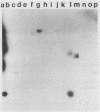Abstract
After the demonstration of analogs of the Legionella pneumophila macrophage infectivity potentiator (Mip) protein in other Legionella species, the Legionella micdadei mip gene was cloned and expressed in Escherichia coli. DNA sequence analysis of the L. micdadei mip gene contained in the plasmid pBA6004 revealed a high degree of homology (71%) to the L. pneumophila mip gene, with the predicted secondary structures of the two Mip proteins following the same pattern. Southern hybridization experiments, with the plasmid pBA6004 as the probe, suggested that the mip gene of L. micdadei has extensive homology with the mip-like genes of several Legionella species. Furthermore, amino acid sequence comparisons revealed significant homology to two eukaryotic proteins with isomerase activity (FK506-binding proteins).
Full text
PDF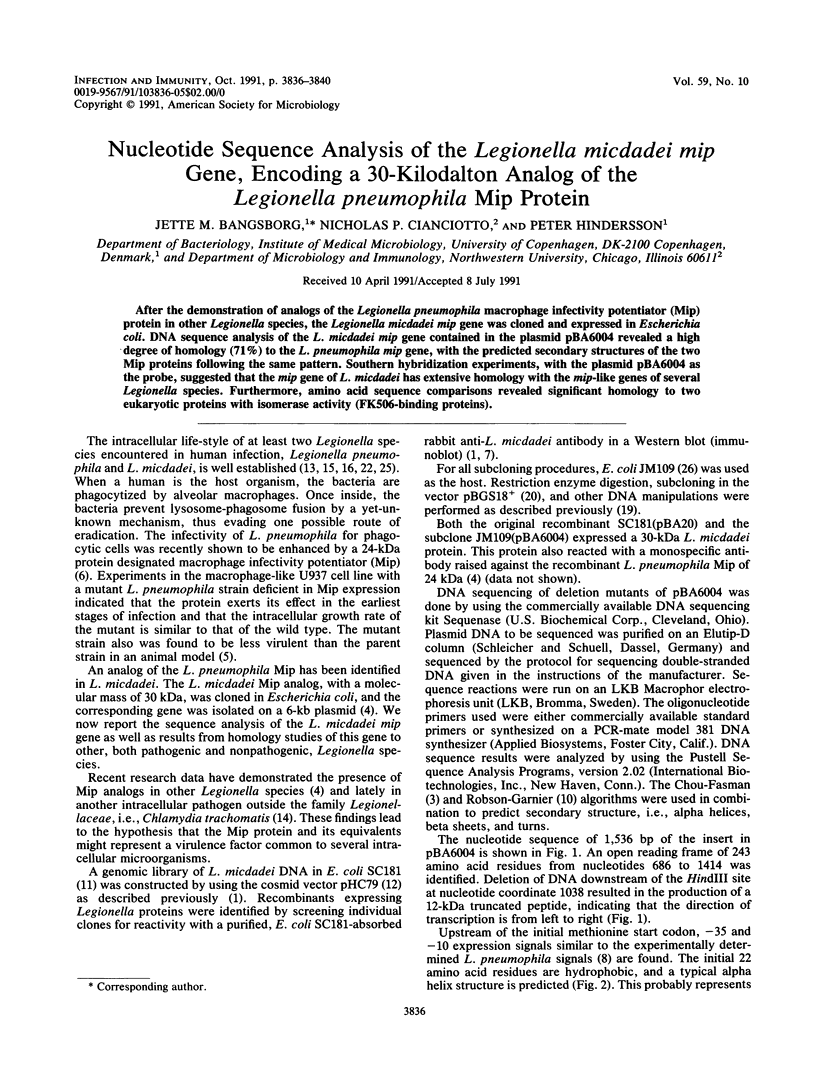
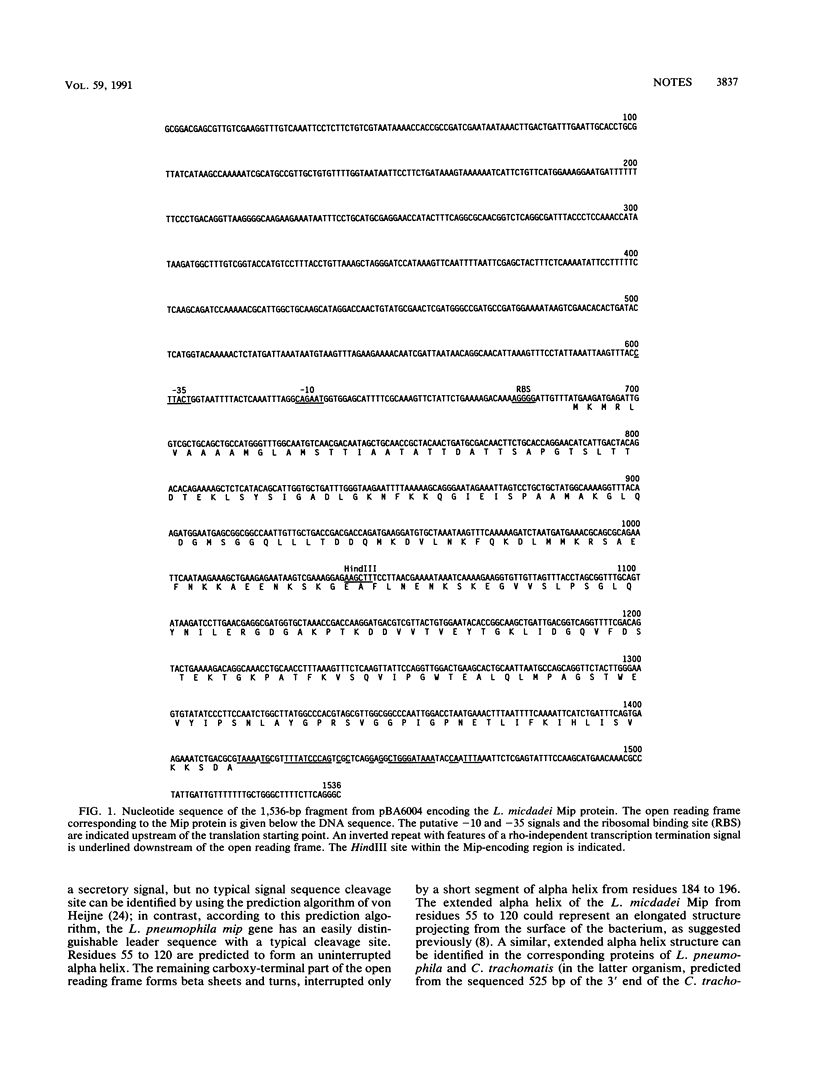
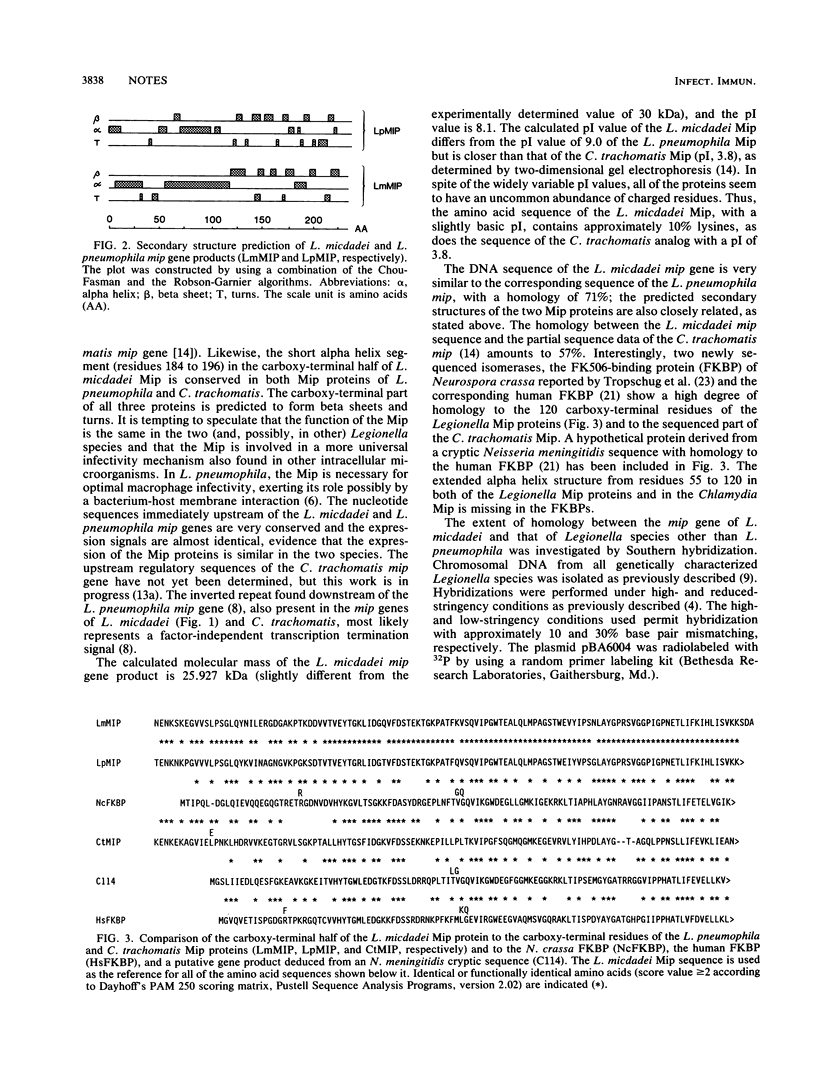
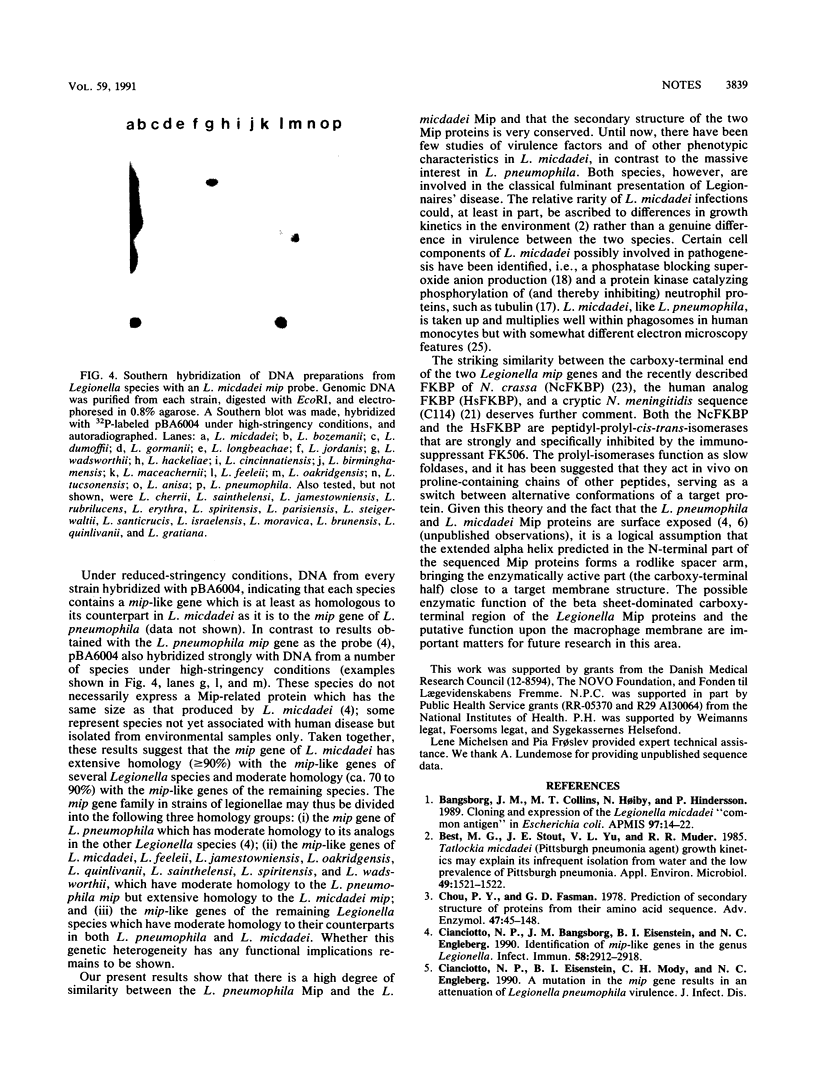
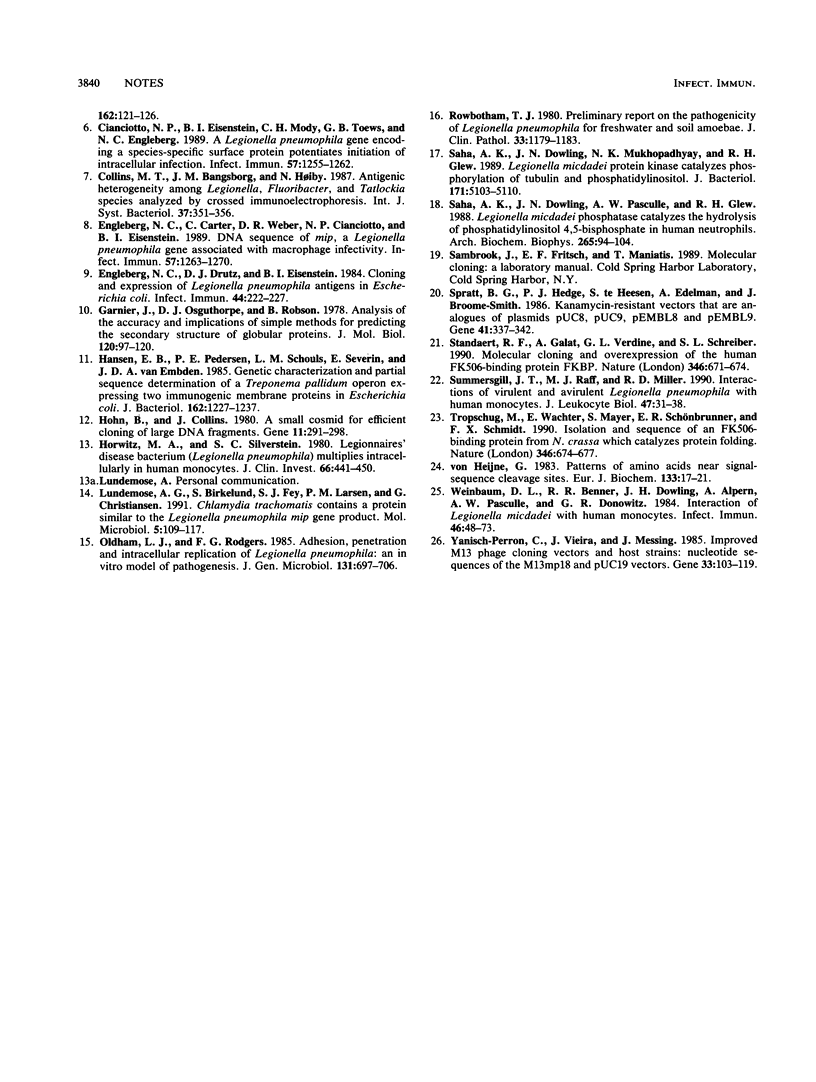
Images in this article
Selected References
These references are in PubMed. This may not be the complete list of references from this article.
- Bangsborg J. M., Collins M. T., Høiby N., Hindersson P. Cloning and expression of the Legionella micdadei "common antigen" in Escherichia coli. APMIS. 1989 Jan;97(1):14–22. [PubMed] [Google Scholar]
- Best M. G., Stout J. E., Yu V. L., Muder R. R. Tatlockia micdadei (Pittsburgh pneumonia agent) growth kinetics may explain its infrequent isolation from water and the low prevalence of Pittsburgh pneumonia. Appl Environ Microbiol. 1985 Jun;49(6):1521–1522. doi: 10.1128/aem.49.6.1521-1522.1985. [DOI] [PMC free article] [PubMed] [Google Scholar]
- Chou P. Y., Fasman G. D. Prediction of the secondary structure of proteins from their amino acid sequence. Adv Enzymol Relat Areas Mol Biol. 1978;47:45–148. doi: 10.1002/9780470122921.ch2. [DOI] [PubMed] [Google Scholar]
- Cianciotto N. P., Bangsborg J. M., Eisenstein B. I., Engleberg N. C. Identification of mip-like genes in the genus Legionella. Infect Immun. 1990 Sep;58(9):2912–2918. doi: 10.1128/iai.58.9.2912-2918.1990. [DOI] [PMC free article] [PubMed] [Google Scholar]
- Cianciotto N. P., Eisenstein B. I., Mody C. H., Toews G. B., Engleberg N. C. A Legionella pneumophila gene encoding a species-specific surface protein potentiates initiation of intracellular infection. Infect Immun. 1989 Apr;57(4):1255–1262. doi: 10.1128/iai.57.4.1255-1262.1989. [DOI] [PMC free article] [PubMed] [Google Scholar]
- Engleberg N. C., Carter C., Weber D. R., Cianciotto N. P., Eisenstein B. I. DNA sequence of mip, a Legionella pneumophila gene associated with macrophage infectivity. Infect Immun. 1989 Apr;57(4):1263–1270. doi: 10.1128/iai.57.4.1263-1270.1989. [DOI] [PMC free article] [PubMed] [Google Scholar]
- Engleberg N. C., Drutz D. J., Eisenstein B. I. Cloning and expression of Legionella pneumophila antigens in Escherichia coli. Infect Immun. 1984 May;44(2):222–227. doi: 10.1128/iai.44.2.222-227.1984. [DOI] [PMC free article] [PubMed] [Google Scholar]
- Garnier J., Osguthorpe D. J., Robson B. Analysis of the accuracy and implications of simple methods for predicting the secondary structure of globular proteins. J Mol Biol. 1978 Mar 25;120(1):97–120. doi: 10.1016/0022-2836(78)90297-8. [DOI] [PubMed] [Google Scholar]
- Hansen E. B., Pedersen P. E., Schouls L. M., Severin E., van Embden J. D. Genetic characterization and partial sequence determination of a Treponema pallidum operon expressing two immunogenic membrane proteins in Escherichia coli. J Bacteriol. 1985 Jun;162(3):1227–1237. doi: 10.1128/jb.162.3.1227-1237.1985. [DOI] [PMC free article] [PubMed] [Google Scholar]
- Hohn B., Collins J. A small cosmid for efficient cloning of large DNA fragments. Gene. 1980 Nov;11(3-4):291–298. doi: 10.1016/0378-1119(80)90069-4. [DOI] [PubMed] [Google Scholar]
- Horwitz M. A., Silverstein S. C. Legionnaires' disease bacterium (Legionella pneumophila) multiples intracellularly in human monocytes. J Clin Invest. 1980 Sep;66(3):441–450. doi: 10.1172/JCI109874. [DOI] [PMC free article] [PubMed] [Google Scholar]
- Lundemose A. G., Birkelund S., Fey S. J., Larsen P. M., Christiansen G. Chlamydia trachomatis contains a protein similar to the Legionella pneumophila mip gene product. Mol Microbiol. 1991 Jan;5(1):109–115. doi: 10.1111/j.1365-2958.1991.tb01831.x. [DOI] [PubMed] [Google Scholar]
- Oldham L. J., Rodgers F. G. Adhesion, penetration and intracellular replication of Legionella pneumophila: an in vitro model of pathogenesis. J Gen Microbiol. 1985 Apr;131(4):697–706. doi: 10.1099/00221287-131-4-697. [DOI] [PubMed] [Google Scholar]
- Rowbotham T. J. Preliminary report on the pathogenicity of Legionella pneumophila for freshwater and soil amoebae. J Clin Pathol. 1980 Dec;33(12):1179–1183. doi: 10.1136/jcp.33.12.1179. [DOI] [PMC free article] [PubMed] [Google Scholar]
- Saha A. K., Dowling J. N., Mukhopadhyay N. K., Glew R. H. Legionella micdadei protein kinase catalyzes phosphorylation of tubulin and phosphatidylinositol. J Bacteriol. 1989 Sep;171(9):5103–5110. doi: 10.1128/jb.171.9.5103-5110.1989. [DOI] [PMC free article] [PubMed] [Google Scholar]
- Saha A. K., Dowling J. N., Pasculle A. W., Glew R. H. Legionella micdadei phosphatase catalyzes the hydrolysis of phosphatidylinositol 4,5-bisphosphate in human neutrophils. Arch Biochem Biophys. 1988 Aug 15;265(1):94–104. doi: 10.1016/0003-9861(88)90375-x. [DOI] [PubMed] [Google Scholar]
- Spratt B. G., Hedge P. J., te Heesen S., Edelman A., Broome-Smith J. K. Kanamycin-resistant vectors that are analogues of plasmids pUC8, pUC9, pEMBL8 and pEMBL9. Gene. 1986;41(2-3):337–342. doi: 10.1016/0378-1119(86)90117-4. [DOI] [PubMed] [Google Scholar]
- Standaert R. F., Galat A., Verdine G. L., Schreiber S. L. Molecular cloning and overexpression of the human FK506-binding protein FKBP. Nature. 1990 Aug 16;346(6285):671–674. doi: 10.1038/346671a0. [DOI] [PubMed] [Google Scholar]
- Summersgill J. T., Raff M. J., Miller R. D. Interactions of virulent and avirulent Legionella pneumophila with human monocytes. J Leukoc Biol. 1990 Jan;47(1):31–38. doi: 10.1002/jlb.47.1.31. [DOI] [PubMed] [Google Scholar]
- Tropschug M., Wachter E., Mayer S., Schönbrunner E. R., Schmid F. X. Isolation and sequence of an FK506-binding protein from N. crassa which catalyses protein folding. Nature. 1990 Aug 16;346(6285):674–677. doi: 10.1038/346674a0. [DOI] [PubMed] [Google Scholar]
- Weinbaum D. L., Benner R. R., Dowling J. N., Alpern A., Pasculle A. W., Donowitz G. R. Interaction of Legionella micdadei with human monocytes. Infect Immun. 1984 Oct;46(1):68–73. doi: 10.1128/iai.46.1.68-73.1984. [DOI] [PMC free article] [PubMed] [Google Scholar]
- Yanisch-Perron C., Vieira J., Messing J. Improved M13 phage cloning vectors and host strains: nucleotide sequences of the M13mp18 and pUC19 vectors. Gene. 1985;33(1):103–119. doi: 10.1016/0378-1119(85)90120-9. [DOI] [PubMed] [Google Scholar]
- von Heijne G. Patterns of amino acids near signal-sequence cleavage sites. Eur J Biochem. 1983 Jun 1;133(1):17–21. doi: 10.1111/j.1432-1033.1983.tb07424.x. [DOI] [PubMed] [Google Scholar]



